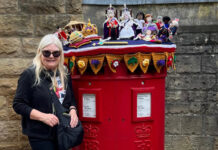Every one of us is unique. We live in bodies that look and sound different than anyone else’s. Therefore, the way we interact with the world around us is different than someone who is a different size, colour, or gender or who has a visible or invisible disability that we may not have.
Because we see the world based on our own experiences, we can sometimes forget that what happens when we head out to the supermarket, go for a walk in the evening, or visit the doctor may not be the same for people who don’t look or sound the way we do.
Learning more about the unique experiences of people who are different than we are is important. Why? Because sometimes we fear what we don’t know. For example, learning about what it means to be transgender through the eyes of a woman who has transitioned can help us better understand the challenges she has faced throughout her life, and make us feel more at ease allowing her to live her authentic life.
Likewise, finding out more about the way someone living with a disability like autism processes the world around them can help us interact with them in a way that makes connection not just possible, but enjoyable for them.
Seeking to understand how our differences change our experiences also means we’re able to empathise with people who are struggling in situations that might be simple for us. More importantly, having that depth of understanding means we can effect change when discriminatory policies or opinions are making other people’s lives harder—and potentially even dangerous.
Talking to people with different lived experiences is a wonderful way to educate yourself, but so is reading. As Oprah Winfrey once said, “Reading is a way for me to expand my mind, open my eyes, and fill up my heart.”
Where should I begin?
Think about what prejudices or biases you may have—because we all do, it’s human nature—or what ways of life are very different than yours that you’d like to know more about. Maybe you have questions you’ve always wanted to ask about – what it’s like being a refugee, or how being Black changes the way you navigate the outside world, or what’s involved in a faith that’s different than yours.
Choosing titles
Select books written by authors from the group you’re interested in. Try not to choose books written about them, because the goal is to learn directly from a refugee, a Black person or a Muslim, for example. You want to know what they think, feel, see and experience rather than reading about their lives filtered through someone else’s lens.
Inspiration to get you started
Residential schools
- Call me Indian: From the Trauma of Residential school to Becoming the NHL’s First Treaty Indigenous Player by Fred Saskamoose
- Five Little Indians by Michelle Good
- You might also select books from this list of 48 books written by Indigenous writers to help you learn and understand more about the residential school experience. It also includes books like The Orange Shirt Story by Phyllis Webstad for young readers.
LGBTQ
- Love Lives Here: a Story of Thriving in a Transgender Family by Amanda Jette Knox
- Check out this list of the 24 best LGBTQ-authored books of 2020.
The refugee experience
- The Ungrateful Refugee by Dina Nayeri
- We are displaced: My Journey and Stories From Refugee Girls Around the World by Malala Yousafzai
Black Lives
- The Hate you Give by Angie Thomas
- Born a Crime: Stories From a South African Childhood by Trevor Noah
- Explore this list of books by Black authors telling stories about the Black experience.
Whatever topic you choose to explore, remember that expanding your understanding of different lived experiences helps to create a more tolerant world, and allows you to interact with people you may meet with more kindness and compassion than you might otherwise know to give. There’s no better reason to hit the library or your local bookstore!




